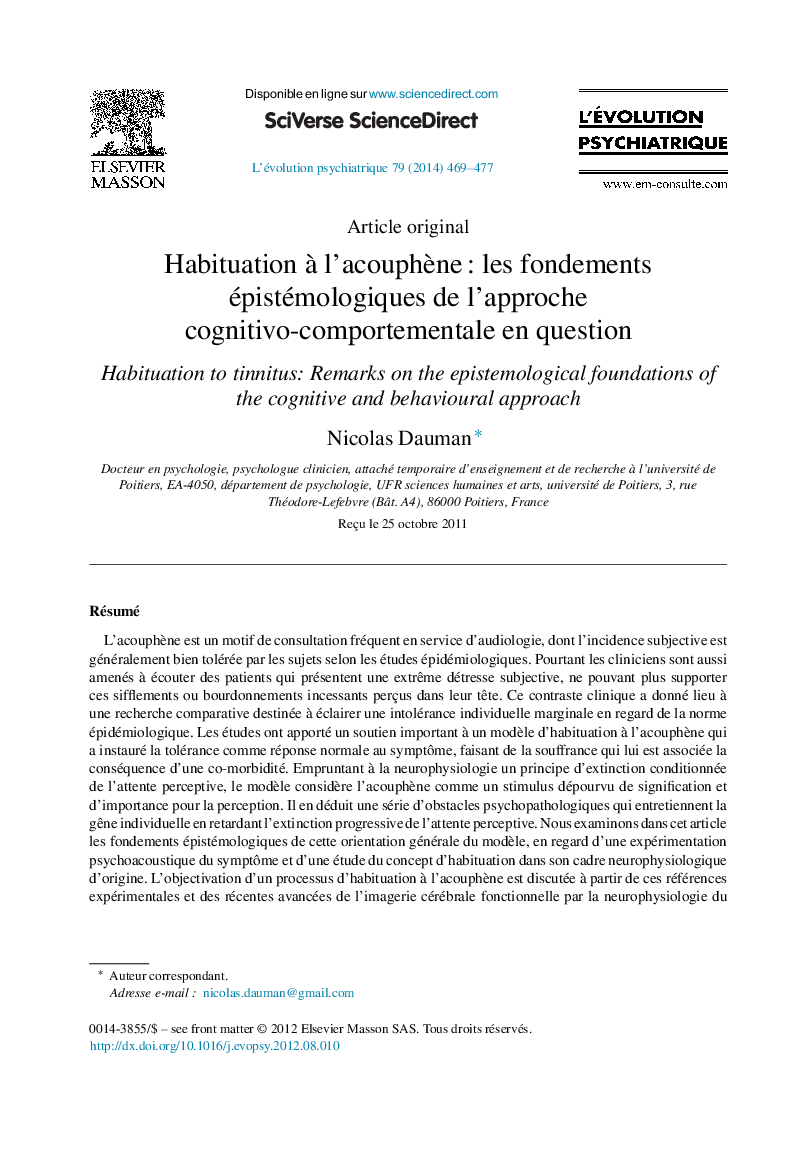| کد مقاله | کد نشریه | سال انتشار | مقاله انگلیسی | نسخه تمام متن |
|---|---|---|---|---|
| 908483 | 917180 | 2014 | 9 صفحه PDF | دانلود رایگان |

RésuméL’acouphène est un motif de consultation fréquent en service d’audiologie, dont l’incidence subjective est généralement bien tolérée par les sujets selon les études épidémiologiques. Pourtant les cliniciens sont aussi amenés à écouter des patients qui présentent une extrême détresse subjective, ne pouvant plus supporter ces sifflements ou bourdonnements incessants perçus dans leur tête. Ce contraste clinique a donné lieu à une recherche comparative destinée à éclairer une intolérance individuelle marginale en regard de la norme épidémiologique. Les études ont apporté un soutien important à un modèle d’habituation à l’acouphène qui a instauré la tolérance comme réponse normale au symptôme, faisant de la souffrance qui lui est associée la conséquence d’une co-morbidité. Empruntant à la neurophysiologie un principe d’extinction conditionnée de l’attente perceptive, le modèle considère l’acouphène comme un stimulus dépourvu de signification et d’importance pour la perception. Il en déduit une série d’obstacles psychopathologiques qui entretiennent la gêne individuelle en retardant l’extinction progressive de l’attente perceptive. Nous examinons dans cet article les fondements épistémologiques de cette orientation générale du modèle, en regard d’une expérimentation psychoacoustique du symptôme et d’une étude du concept d’habituation dans son cadre neurophysiologique d’origine. L’objectivation d’un processus d’habituation à l’acouphène est discutée à partir de ces références expérimentales et des récentes avancées de l’imagerie cérébrale fonctionnelle par la neurophysiologie du symptôme. Les enjeux cliniques de cette analyse sont indiqués en conclusion, ouvrant la discussion sur l’opportunité d’une autre approche de la souffrance subjective.
Tinnitus is frequently a motive for consultation in audiological services, which is generally a tolerated symptom according to epidemiological studies. However clinicians must also give counselling to some distressed patients, for whom the ringing in the ear are unbearable, leading to significant emotional disorders. The clinical contrast between suffering and non-suffering tinnitus patients has suggested comparative researches in order to enlighten this minor lack of tolerance to tinnitus compared to an epidemiological normal response. Studies have supported an habituation model to tinnitus which stands that habituation is the normal state of perception of tinnitus, and inhabitation is the result of a psychiatric co-morbidity. Referring to the neurophysiological principle of a natural inhibition of the orienting reflex with repeated stimulations, the habituation model states that tinnitus is a meaningless stimulus for the perception. Several psychopathological roadblocks (related to anxiety and depression) would prevent this natural inhibition to occur, leading to individual annoyance. In this article we analysed the epistemological foundations of the habituation model framework, regarding to experimental results in the psychoacoustics of tinnitus, and the concept of habituation in its neurophysiological framework. The process of habituation to tinnitus is discussed from these experimental references and recent progress in magnetic resonance imaging (MRI) from the neuroscience of tinnitus. Clinical implications of this analysis are suggested in conclusion, opening the discussion to the opportunity of another clinical approach of patients suffering from tinnitus.
Journal: L'Évolution Psychiatrique - Volume 79, Issue 3, July–September 2014, Pages 469–477